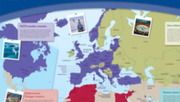
Nazi Propaganda Minister Joseph Goebbels:
“If you tell a lie big enough and keep repeating it, people will eventually come to believe it. The lie can be maintained only for such time as the State can shield the people from the political, economic and/or military consequences of the lie. It thus becomes vitally important for the State to use all of its powers to repress dissent, for the truth is the mortal enemy of the lie, and thus by extension, the truth is the greatest enemy of the State.”
also... “The most brilliant propagandist technique will yield no success unless one fundamental principle is borne in mind constantly - it must confine itself to a few points and repeat them over and over”
Joseph Goebbels was appointed Reich Minister of Propaganda On March 13th 1933. Goebbels proved to be an expert in his mastery of the dark art of propaganda. Goebbels had no formal training in any aspect of propaganda. However, he did seem to fulfil what Adolf Hitler wrote in ‘Mein Kampf’ with regards to the truth: if you are going to tell a lie, tell a big one and if you tell if often enough, people will begin to believe it.
http://www.historylearningsite.co.uk/joseph_goebbels_propaganda.htm
Russia accuses NATO chief of lying
http://www.aa.com.tr/en/world/378054--russia-accuses-nato-chief-of-lying
23 August 2014 20:32 (Last updated 23 August 2014 20:37)
As tension grows between Russia and the West, the Russian Foreign Ministry alleged 'another lie' by NATO Secretary General Anders Fogh Rasmussen
ussia has stepped up its war of words with NATO and the West, calling NATO Secretary General Anders Fogh Rasmussen’s comments on the aid convoy that crossed into Ukraine “another lie.”
Rasmussen condemned Russia for sending an unauthorized humanitarian aid convoy into Ukraine on Friday without the involvement of the International Committee of the Red Cross.
On Saturday, the Russian Foreign Ministry said: “Rasmussen claims that [the] Russian humanitarian aid convoy entered Ukrainian territory ‘without the consent of the Ukrainian authorities and without any involvement of the International Committee of the Red Cross,’ which is another lie.”
The statement claimed Russia had secured the consent of the Ukrainian government on August 12 for the convoy to cross the border.
When the convoy crossed into Ukraine, state security chief Valentin Nalivaychenko called it a “direct invasion by Russia.”
The convoy of hundreds of trucks has now returned to Russia.
NATO also claimed on Friday that Moscow had sent Russian-manned artillery units into Ukraine, which were shelling Ukrainian government forces as part of a "major escalation."
Rasmussen added that heavy weaponry including armor and artillery had been recently transferred to separatist groups in eastern Ukraine while Russia increased the number of troops close to the Ukrainian border.
Meanwhile, German Chancellor Angela Merkel met with Ukrainian President Petro Poroshenko in Kiev on Saturday.
Merkel said that the Ukrainian border with Russia should be internationally monitored by the Organization for Security and Cooperation in Europe so a cease-fire and peace plan could be put in place.
Merkel's visit precedes talks between Poroshenko and Russian President Vladimir Putin at the Eurasian Union summit in Minsk, Belarus, on Tuesday.
Eric Draitser appears on Voice of Russia to discuss the role of western media in shaping how Americans and Europeans understand the conflict in Ukraine, Russian perspectives, and more. Draitser explains that the US corporate media is a propaganda mouthpiece of US foreign policy, and that the coverage of Ukraine from US and European media has merely parroted the talking points of US-NATO. He examines how anti-Russian attitudes are deeply embedded in US public consciousness, and therefore it’s not at all surprising to see how public opinion is so easily molded to fit the interests of Washington. Draitser also details how the long-standing policy of NATO expansion is part of a broader post-Soviet imperial agenda, one that has defined US foreign policy for more than two decades
http://stopimperialism.org/interview-ukraine-russia-western-media/

6:38

4:51

13:26

2:48

35:28

16:37

3:51